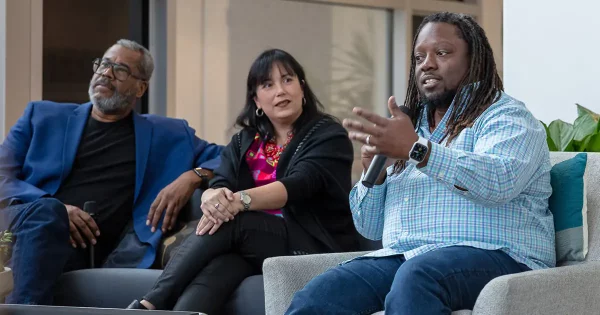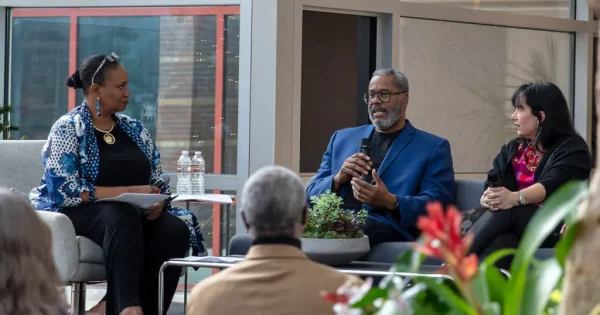Business leaders called for change at GSD&M’s summit this week in Austin, Texas
By Kathryn Lundstrom from Adweek

Industry execs Terry King, Bernadette Rivero and Qadree Holmes sat on a panel discussion called “Real Talk: Moving Beyond Your Diversity Checkbox.”
As the industry grapples with a reckoning on payment terms and the request for proposal (RFP) review process, diverse-, minority- and women-owned companies—those with smaller teams and often without reserves of cash on hand—are often hardest hit.
And while areas of the ad industry brace for an economic downturn and tightened ad budgets, some vendors are extending the time it takes to pay their partners, while others are shortening the RFP process and calling for quicker turnaround times for campaigns, putting pressure on smaller outfits.
At a summit hosted by Austin, Texas-based agency GSD&M, AAF Austin and the Omnicom Advertising Collective this week, business leaders expressed frustration at the added challenge that long payment terms and truncated RFP processes create for small and medium-sized companies. This represents two of the many procedural sticking points that make it harder for diverse vendors to get a shoe in the door with major agencies that claim they want to diversify their partners.
The panel on challenges facing diverse vendors was moderated by Sophie Gibson, founder and CEO of Atlanta-based creative agency Vivo. Panelists included Terry King, owner of Detroit-based post-production house Territory Post, Qadree Holmes, founder and president of Chicago-based Quriosity Productions, and Bernadette Rivero, president and executive producer of The Cortez Brothers, Inc, in Los Angeles.
A second panel on the RFP and treatment process, featuring current and former GSD&M employees, was moderated by Jack Epsteen, svp of production.
‘Draconian payment terms’
“As much as people say they want a small business and a women-owned business, then they give you these draconian payment terms that will put you out of business,” Lauren Schwartz, owner of San Francisco-based Kaboom Productions and an attendee at this week’s event, told the panelists and audience members.
An undercurrent to the conversation was last month’s bombshell report showing that Keurig Dr. Pepper recently demanded 360-day payment terms from agencies participating in its public relations RFP process. Standard payment terms range from 60-90 days but can creep up to 120-180 days on the longer end.
As brands opt for longer payment terms, that puts pressure all the way down the supply chain—landing hardest on small businesses with less cash on hand and more limited credit lines.
“We can’t pay you until the clients pays us,” Epsteen told the audience. “This is something we all need to change because it just falls downhill and hurts the smallest business out there.”
Agencies have the option to sell their invoices to supply chain lenders, as Keurig Dr. Pepper encourages its suppliers to do. But in that case, getting paid quicker means even slimmer margins.
Paying half when the bid is won, and the other half when the project wraps is one way to ease the pressure, suggested Leslie Harro, owner and executive producer at LA-based production company Havoc.
“We shot a job in August and still haven’t been paid by an agency,” she told Adweek after the event. “I need to be focusing on creating opportunities for our directors and not worrying about whether or not we can pay our bills.”
Seek out diverse firms from the start
Beyond payment terms, Gibson, Rivero and Holmes also noted the extremely short turnaround times. That can happen because when an agency realizes late in the game that it didn’t have a diverse bidder in the pool, they explained, and reach out to minority-owned businesses for a bid simply to meet diversity-related procedural criteria.

Sophie Gibson, Terry King and Bernadette Rivero discussed the challenges facing diverse-owned vendors.
“That puts me, as a production company, in a really terrible spot,” Rivero explained. “Do I push my team to the very limits … knowing we were the last choice and that we’re only there because someone’s holding the proverbial diversity gun to their head?”
Giving more lead time ahead of a bid—just a few days, or even a week, Rivero suggested—puts smaller companies in a better position.
The panel conversations, part of GSD&M’s 2022 Diverse Partner Summit, were meant to offer a frank look at the challenges facing diverse-owned vendors. The three-day summit also offered diverse- and minority-owned businesses a chance to meet with GSD&M and representatives from other agencies and brands committed to diversifying their vendor pools during two days of speed dating-style introductions hosted on a virtual platform. The summit is part of GSD&M’s longstanding diverse vendor program, which was first formalized in 2004, the agency said.
In addition to RFPs and payment terms, participating vendors also highlighted the costs and administrative burdens associated with certifications that identify their firms as minority-, women- or LGBTQ-owned. Those challenges further disadvantage companies already facing an uphill battle due to lack of representation, systemic racism and fewer opportunities to build out a strong reel, resume or portfolio.




